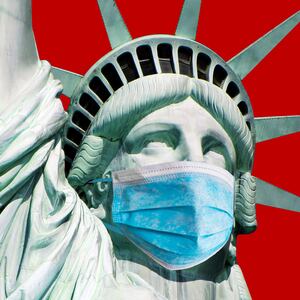Hours before a new coronavirus crackdown began in New York, Borough Park was fuming.
On Monday, Gov. Andrew Cuomo ordered public and private schools to close in 20 New York City ZIP Codes where positivity rates had spiked in recent weeks, most of them home to substantial ultra-Orthodox Jewish communities. Anger was already palpable that afternoon on the streets of one of the hottest hotspots citywide, a traditional home of New York’s Hasidic population.
“It’s just political theater,” raged Mike Weber, whose teenage sons attend the Nesivos Hatalmud yeshiva, standing maskless outside the facility on the neighborhood’s north end. “I’m not concerned about corona, I’m concerned about the kids.”
ADVERTISEMENT
By Tuesday evening, tensions were at a boiling point as hundreds of ultra-Orthodox community members took to the streets in protest over the crackdown. The New York Post reports protesters lit garbage on fire and refused orders to disperse, and “chased away two city sheriff’s deputies who responded.” A report from the scene said the crowd was chanting “Jewish Lives Matter!”
Religious learning institutions, which the broad majority of students in the affected precincts attend, were actually closed already for the Jewish holiday of Sukkot, which ends Friday. But nearly every yeshiva in Borough Park featured an attached sukkah—a temporary enclosure, somewhere between a tent and a hut—from which largely maskless men and boys streamed in and out all afternoon.
The governor’s order Monday left such places of worship untouched—only for him to decree Tuesday that they could only accommodate up to 10 people at a time.
Even community leaders who agreed with the decision to shut down yeshivas and take other pandemic containment measures in the world’s former coronavirus epicenter decried the incessant mixed and conflicting messages from Cuomo and Mayor Bill de Blasio. The governor’s Monday order came a day after the mayor called for closing not just schools but local businesses, and to begin that program not Tuesday but on Wednesday. Cuomo’s initial order this week pertained only to schools, only for him to relent Tuesday and instruct nonessential businesses in designated “red zones” to close as well.
That latest announcement was light on details, but included plenty of complaints from the governor about how the city’s failure to clamp down on social distancing and mask-flouting scofflaws made the new crackdown necessary.
“If the plan I passed into law was actually enforced, we wouldn’t be here,” Cuomo said at a press conference in Albany.
The jockeying fits a pattern dating to the earliest days of the pandemic, when Cuomo undercut de Blasio’s efforts to impose a stay-at-home order and switch students to remote learning in the five boroughs—before issuing such orders himself.
“We’ve had an issue with a consistent message from the city, the state, to the community,” Alan Kadish, an Orthodox Jewish physician and president of Touro College, a private Jewish university in New York, told The Daily Beast. “When you have a news conference where the city and the state are at odds, it's harder for the community to feel a partnership with a single voice that’s saying ‘This is what we need to do to make things right, this is what we need to do to keep kids educated.’ It’s frustrating."
Cuomo’s office did not provide an on-the-record statement by deadline. The mayor’s office told The Daily Beast it had conducted 7,443 tests across the nine ZIP Codes with the highest positivity rates—while taking an apparent jab at the governor’s push to crack down on violators.
“While others focus mostly on ‘enforcement’/ticketing, the city believes we must have an ‘all of the above’ approach that surges in testing, education, outreach, nd enforcement. That’s what is proven to work,” said spokesman Bill Neidhardt.
In response to the governor’s directives, Touro will close not only its higher-education and research facilities, but also a yeshiva it operates in the highlighted ZIP Code of Kew Gardens Hills in Queens next week. Kadish characterized the school-closure order as “reasonable” from a medical perspective.
Less reasonable, he argued, was a failure by the state and city governments to collaboratively outline a path for the schools to reopen if the positivity rate comes down. Several of the parents The Daily Beast spoke with this week asserted—without evidence—that any second wave of the coronavirus was less severe than the first, and that the high proportion of infections in religious Jewish communities was a consequence of only ill people taking the test.
“It’s only a couple percent of an increase, it’s not like we had before. It’s completely different now,” complained Jack Brody, whose 20 grandchildren attend schools scattered across Borough Park, as he prepared to join a mass of other unmasked men inside the sukkah at the United Talmudical Academy.
Kadish said there was some evidence to support these contentions, but that deeper study was needed. That’s why it’s essential, he argued, that de Blasio and Cuomo lay out a roadmap for school reopenings that engages the broader population of Borough Park and gets them tested. Gothamist, meanwhile, reported last week that some local leaders appeared to be taking steps to deflate COVID-19 testing numbers in embattled Orthodox areas.
“Any proposal to close the schools should be accompanied by widespread testing this week, so we know what the magnitude of the problem is,” Kadish said. “With the right encouragement, particularly by saying that there’s willingness to open the schools as soon as possible if the infection rate goes down, that will galvanize the community to access the resources that are available to get testing done.”
The impact of the clashing directives from Albany and City Hall was evident on the ground in Borough Park. One local rabbi, who asked to speak anonymously because his yeshiva’s board had not authorized him to comment, pointed to the discrepancy between Cuomo’s school-closure order and de Blasio’s push to also close shops as proof that the entire plan was arbitrary and politically motivated.
“Why didn’t he close all the businesses? Because all the business owners said it would be the final nail in the coffin for them,” the rabbi alleged. “The kids just can’t speak up for themselves, but it’s the final nail in the coffin for them.”
The religious leader gave vent to fears that young children might fall years behind on reading instruction while high schoolers could miss the state’s Regents examinations for a second time, after New York canceled the annual evaluations due to the pandemic this spring.
Kadish and other experts explained the special sensitivity around the yeshivas, which have been a point of tension for years. Critics and local dissidents have long complained that some of the schools fail to provide adequate secular instruction, and the city shuttered several that did not mandate student vaccinations during a deadly measles outbreak last year.
Rabbi Chaim David Zwiebel, vice president of the nonprofit Agudath Israel, noted that many ultra-Orthodox practitioners lack an Internet connection and other technologies that permit children to study remotely and for parents to obtain reliable information about current affairs—including the pandemic. The yeshivas, in the view of many, are the only way to ensure the continuation of ultra-Orthodox traditions.
“As a community, there’s nothing more precious and important to us than transmitting the Jewish heritage to our children and next generation,” Zwiebel said. “This is the central religious obligation that parents have to their children in the Jewish faith. And that is to make sure the next generation will be part of the link that goes all the way back to Sinai. You need Jewish schools.”
But the mayor’s office does not have the power to reopen the schools now that Cuomo has closed them. And a coordination roadmap for on-site lessons to begin again is still missing.
“We have an opportunity to do widespread testing this week, to demonstrate what the real infection rate is, to see what the real hospitalization rates are, and determine when the schools can be allowed to open,” said Kadish. “If we don’t take that opportunity, then the decision is a bad decision, because this time will be wasted.”






